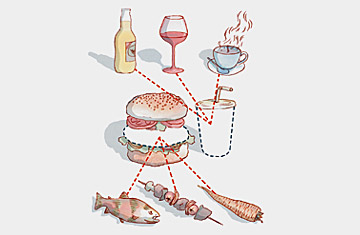
The special signs for ebi filet-o set would never be found at my local restaurant's counterpart in California. And were I in Paris, I'm not sure any of the waitresses would be so gracious and well dressed, let alone would cup my hand so tenderly as she offered me change for my Petit Pancake and Corn Potage Soup. Nor, I think, would every customer be dressed in a Burberry scarf. So even before I've ordered my Sokenbicha or rosehip-and-hibiscus tea, a part of me knows that I'm in Japan.
Yet when my friends visit me, from New York or London, they never seem very delighted when I bring them to this McDonald's parlor (admittedly a tiny one) at my local train station, in the suburbs of Nara, the ancient Buddhist capital of Japan. And they don't look much happier when I tell them that we can eat the Chinese cabbage and broccoli au gratin that Colonel Sanders is dishing up downstairs, or sample a strawberry mille-feuille crepe at Starbucks near the platform entrance. The places I'm inviting them to could not be more indicative of life in Japan, or almost anywhere, today: Live globally by eating locally. Yet our minds have not always adapted to the fact that many of the essential restaurants in the world these days are not indigenous and not American, but a wild and shifting mixture of the two—a floating café of a whole new global order.
It's common in the new century to acknowledge that most Thai food is consumed a long way from Bangkok, just as Burgundy wine is as likely to be found in Mexico City and Seoul as in Paris. And it seems only normal to many of us nowadays to find tacos, pizzas and moussaka on the menu of a little café in the Himalayas, as it is to find wasabi mousse on offer in London. Such novel hybrids are the natural products of a world where the woman at the next table looks Japanese, sounds Brazilian and probably lives in San Francisco. But when we are taking of global eating—even of "fusion cuisine"—we often overlook the most common and ubiquitous global meals of all.
I know that for some people fast food is the very enemy of individualism and care, the healthy habits that life has traditionally meant. I've seen the terrifying anti-McDonald's movie Super Size Me, I've devoured the eye-opening book Fast Food Nation. I see every day how an American junk-food tradition is changing the very shape of Japanese kids, and playing havoc with the slow-food rites that cement community and family. Not truly America and not classically itself, Japan finds itself in a modern limbo, for which chicken tatsuta burgers are a handy symbol. And yet it would be hard to deny that such food is not popular across the world just because it is everywhere; it is everywhere because it is so popular.
When I was growing up in Oxford, England, my only possible options for eating out consisted of snooty haute-cuisine palaces on one side of town and greasy fish-and-chips shops on the other. When McDonald's finally arrived in Oxford, in the mid-1970s (followed quickly by Baskin-Robbins and KFC and others), suddenly I could get something that was clean (compared with the "beefburgers" of English cafés), reliable and unpretentious. Not expensive, but not too cheap—democracy in action.
Not long ago, I found myself in La Paz, Bolivia, where the central McDonald's outlet came with an armed guard and a Seiko watch in a display case. (Because it was newer and more exotic, the place was more expensive than the chic French café next door.) One month later, in New Delhi, the McDonald's I entered was as potently Indian—thick with the smell of spiced cardamom tea, crowded and clamorous and largely filled with vegetarian offerings—as any other restaurant around Connaught Circus.
There was no question, in either case, that I was savoring the Andes and South Asia respectively. My foreign friends, when they visit Japan, may opt for sushi and teppanyaki. But my Japanese friends, when I ask them where they want to eat, may as often as not direct us toward the Wa-Fu Chicken Cutlet Sandwich behind the kimono-clad figure of Colonel Sanders. If you are what you eat, then more and more of us these days are impenitent—and fast-chewing—globalists. In the modern world, after all, global and local may be one and the same thing.